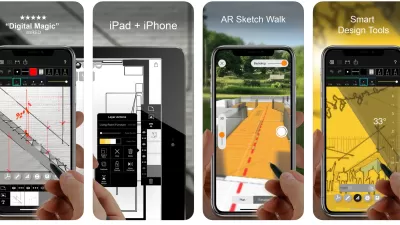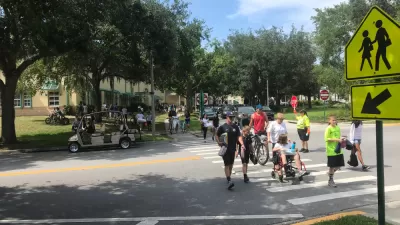Search engines and mobile apps are becoming increasingly localized and personalized, providing recommendations based on who and where we are. These changes have the potential to impact our cities by encouraging people to broaden their experiences.

I am in Glasgow, Scotland with students and faculty from around the world learning about Cities and Citizens in the Digital Age. The sessions have been wonderful, and I will be sharing installments about a number of the key sessions of interest to the Planetizen community.
As professionals, we are increasingly looking for analytical tools to better understand what is happening in cities. For example, if a city is interested in the success of redevelopment in a neighborhood, how could they tell whether the neighborhood has more activities this year than in the year before? How do we know if a neighborhood is becoming a popular destination? Beyond our professional interest there is also the personal interest: What new restaurant should I go to? What's the best new art gallery?
Dr. Craig Mac Donald, an information retrieval researcher in the School of Computing Science at the University of Glasgow, spoke on citizen information needs within smart cities. MacDonald is interested in is how search engines can work better. You might have noticed that when you enter a Google search that it increasingly knows what you are looking for by offering auto completion. Sometimes the auto completion seems eerily accurate as to what you were hoping to search for. Currently, 50 percent of Google searches come from a mobile phone. This means that increasingly people are searching for information that is locally focused and timely—such as restaurants nearby.
Now imagine you are at home and you want to go out for the evening. Right now, you can go to yelp or other sites. But these sites do not provide personalized recommendations—they are close by or they meet the criteria of a specific search term.
Personalized and time aware recommendations are just around the corner. Your mobile phone knows your location, day of the week, and the time of day. The phone knows where you have gone before based on previous social media activity—for example check-ins at museums and pages you have liked on Facebook. It is possible based on this combination of information to make a contextual suggestion, offering nearby locations that are most suitable for you.
To see how well this works, MacDonald recruited 100 people in three cities—London, San Francisco, and Amsterdam—and used their model to offer suggestions for users. The Entertain Me mobile app integrates with Foursquare and Facebook to provide venue-centric and time-aware recommendations. Residents picked a neighborhood they would like to go on the app. The app then provides recommendations. Residents found the personalized suggestions were preferred over what they would have found through a normal search.
This could be expanded to integrate weather conditions—if it is sunny or raining it could offer better recommendations.
From a city perspective, how would personalized recommendation shape our city? Would it encourage residents to explore more new places in different parts of the city? Would it discourage people from going to less popular neighborhoods? And how could we use increased/decreased checkins to better understand neighborhood change. Would we be able to better understand revitalization or decline?

Planetizen Federal Action Tracker
A weekly monitor of how Trump’s orders and actions are impacting planners and planning in America.

Vehicle-related Deaths Drop 29% in Richmond, VA
The seventh year of the city's Vision Zero strategy also cut the number of people killed in alcohol-related crashes by half.

As Trump Phases Out FEMA, Is It Time to Flee the Floodplains?
With less federal funding available for disaster relief efforts, the need to relocate at-risk communities is more urgent than ever.

More Apartments Are Being Built in Less-Dense Areas
Rising housing costs in urban cores and a demand for rental housing is driving more multifamily development to exurbs and small metros.

Plastic Bag Bans Actually Worked
U.S. coastal areas with plastic bag bans or fees saw significant reductions in plastic bag pollution — but plastic waste as a whole is growing.

Improving Indoor Air Quality, One Block at a Time
A movement to switch to electric appliances at the neighborhood scale is taking off in California.
Urban Design for Planners 1: Software Tools
This six-course series explores essential urban design concepts using open source software and equips planners with the tools they need to participate fully in the urban design process.
Planning for Universal Design
Learn the tools for implementing Universal Design in planning regulations.
Borough of Carlisle
Smith Gee Studio
City of Camden Redevelopment Agency
City of Astoria
Transportation Research & Education Center (TREC) at Portland State University
Camden Redevelopment Agency
City of Claremont
Municipality of Princeton (NJ)





























